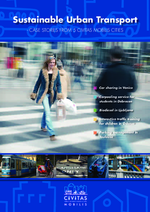Promoting cycling and its integration with public transport services
Summary
Dedicated infrastructure and user-friendly bicycle rental services are essential if cycling is to be considered a genuine alternative to private motorised transport.
Implementing sustainable mobility
In light of two surveys carried out in 1990 and 1996 and showing that the modal share of cycling was around 4 percent at conurbation level, Toulouse partners aimed to develop and promote cycling through the MOBILIS project. Following the surveys, the city of Toulouse had made efforts to promote bicycle use in the urban area by improving and extending the bicycle network. Based on the results of a study carried out as part of the European CENTAUR project (Clean and Efficient New Transport Approach for Urban Rationalisation) between 1997 and 1999, plans were drawn up for the building of new infrastructure in response to cyclists’ needs.
Progress
As a first step, a cycling working group updated knowledge about existing bicycle use, the wishes and expectations of cyclists, and existing barriers to bicycle use.
At the end of 2006, the city launched a tender for the opening of bicycle rental stations a the entrances to metro stations and at large bus interchange in order to promote integration with the public transport system. However, the procedure was cancelled at the end of January 2007.
A guide on how to promote cycling was produced, which addressed a variety of measures, including cycling infrastructure development, improving signs, facilitating services and improving communication.
A new call for tenders was made for the introduction of the Velo-Toulouse bike rental system. The first 60 stations equipped with 600 bicycles were opened in November 2007, and by the end of 2008, 253 stations (2,400 bicycles) were available.
Outcomes
The extension of the cycle route network by around 70 percent in the conurbation, the new secure cycle parking racks, which were installed in December 2008 at underground stations, and the implementation of the new bicycle rental system can be seen as positive outcomes of the cycling working group.
During 2006, Tisseo and Toulouse municipality rented out 63,000 bicycles. By December 2008, following the opening of the Velo-Toulouse service in November 2007, some 11,460 subscribers had registered; 614,000 daily and weekly cards had been sold; around 3,800 cycle rentals had been registered daily on average; and each bicycle had been rented 2.4 times a day. The number of people renting bikes tripled in one year. The majority of users are long-term subscribers and the survey carried out by the system operator JC Decaux highlighted that men represented two-thirds of long-term subscribers. Most users were between 26 and 35 years old (36 percent) and rentals took place between 12:00 and 20:00. The implementation of the Vélo-Toulouse system created 42 new jobs. Due to the 253 automatic rental stations, bicycles have become more visible in the city.
There was a global increase in bicycle use, even though the modal share remained very low (3 percent for the conurbation of Toulouse). Levels of intermodality, including bicycle use, remained very low. For distances of about 2 to 3 km, the modal share of cycling was equal to that of public transport. There was a significant increase in safety conditions for cyclists.
Further findings were that, in order to develop cycling policy and promote cycling use, it is essential to create a cycling working group involving all appropriate stakeholders; identify users’ needs and expectations as clearly as possible; and develop integrated strategic bicycle promotion with the cycling working group (including marketing, infrastructure and “software”) dealing with all these factors.
The implementation of automatic rental stations must be adapted to citizens’ needs and the urban structure. The redesigning of city centre spaces offers a good opportunity to implement this type of service. The system must be eassy to use and widely available.








